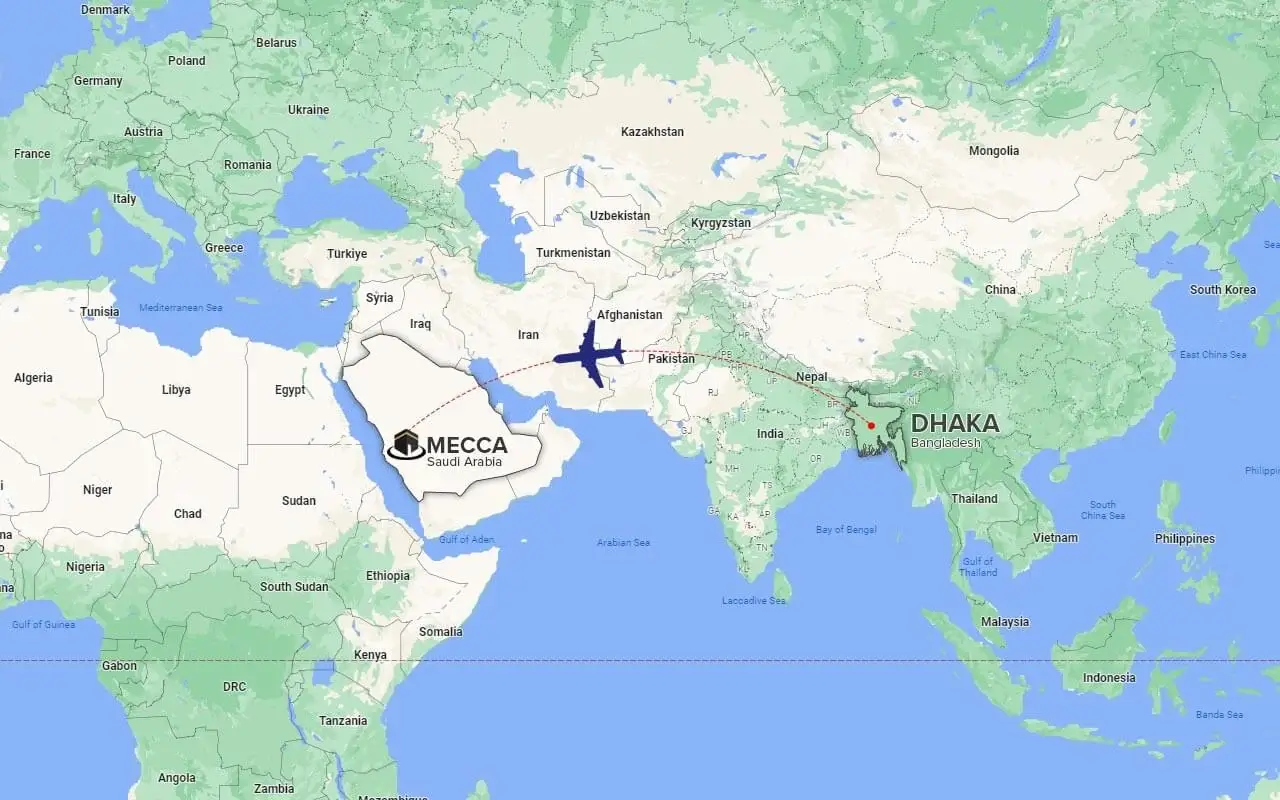Detailed Umrah guidelines | Step-by-step performing umrah
Undertaking the sacred journey of Umrah is a deeply enriching experience that leaves a lasting impact on the hearts and souls of believers. This holy journey to the blessed cities of Mecca and Medina is a unique opportunity for believers to draw closer to Allah, seek forgiveness, and renew their faith.
It is an opportunity for self-reflection, repentance, and seeking Allah's blessings. This guide by Hijaz Hajj Umrah Ltd. will provide you with essential Umrah guidelines to ensure a smooth and spiritually enriching experience.

Understanding Umrah: A divine pilgrimage
Umrah is an act of worship performed by millions of Muslims every year. Following in the footsteps of Prophet Muhammad (PBUH), believers experience deep spiritual connections, seek Allah's blessings, and find opportunities for self-reflection and repentance.
Umrah has four (4) different customs:
- Putting up of Ihram
- Tawaf
- Sa’yee
- Halq or Taqsir

Preparing for Umrah: Step-by-step guide
Preparing for Umrah is not just about physical arrangements; it's about nurturing your soul and heart and anticipating the spiritual journey that lies ahead.

The Niyyah
Before embarking on the sacred pilgrimage of Umrah, Muslims are encouraged to set their hearts on the profound act of Niyyah, or intention. The Niyyah for Umrah is a heartfelt commitment to embark on this spiritual journey solely for the sake of Allah, seeking His pleasure and blessings.
Attaining a state of Ihram
Before commencing the journey, pilgrims must enter the state of Ihram, a sacred state of purity and devotion. This involves wearing the designated white clothing for men and dressing modestly for women. During Ihram, certain actions are prohibited, such as cutting hair or nails, using perfume, and engaging in arguments or harmful behavior.
Reciting Talbiyah
Talbiyah is a profound and sacred invocation recited by Muslims during the pilgrimage of Hajj and Umrah. Derived from the Arabic word "labbayk," meaning "here I am," it reflects the pilgrim's humble response to Allah's call to embark on this spiritual journey.
Talbiya is,
لَبَّيْكَ اللهُمَّ لَبَّيْكَ - لَبَّيْكَ لَا شَرِيْكَ لَكَ لَبَّيْكَ - إِنَّ الْحَمْدَ وَالنِّعْمَةَ لَكَ وَالْمُلْكَ - لَا شَرِيْكَ لَكَ
Pronunciation: Labbayk allahumma labbayeek, labbayeeka l’aa sharika laka labbayeek, innal-ḥamda wan-ni’mata, laka wal-mulk, l’aa sharika lak.
Engaging in spiritual preparation
Preparing for Umrah requires more than just physical arrangements. Pilgrims are encouraged to engage in spiritual preparation by seeking forgiveness, reading the Quran, and increasing acts of worship in the days leading up to their departure.
The rites of Umrah: A profound spiritual journey
The rites of Umrah offer a unique opportunity for self-reflection, devotion, and a renewed connection with the divine, making this journey an unforgettable and life-changing experience.

Tawaf: Circumambulation of the Kaaba
Upon reaching the Masjid al-Haram in Mecca, pilgrims perform Tawaf, which involves walking seven times around the Kaaba in a counterclockwise direction. This ritual represents the commitment to Allah and the solidarity of Muslims.
Sa’yee: Walking between Safa and Marwah
After Tawaf, pilgrims perform Sai, walking seven times between the hills of Safa and Marwah. This commemorates the actions of Hajar, the wife of Prophet Ibrahim (peace be upon them), who searched for water for her son Ismail in the exact location.
Halq or Taqsir
Halaq refers to the act of shaving or trimming the hair after completing the Hajj pilgrimage, a mandatory religious duty for Muslims who are physically and financially able to undertake it. For those, who choose not to shave their heads completely, trimming a portion of the hair is also acceptable.
Prayers and supplications
Throughout the Umrah journey, prayers and supplications hold great significance. Pilgrims are encouraged to spend time in reflection, asking for forgiveness, and making sincere prayers for themselves, their families, and the entire Muslim community.
Umrah: A journey of a lifetime
Undertaking the sacred journey of Umrah is a deeply enriching experience that leaves a lasting impact on the hearts and souls of believers. It is a unique opportunity to seek closeness to Allah, purify the soul, and strengthen one's faith. By following these essential Umrah guidelines, you can embark on a journey of a lifetime, leaving behind a transformed and spiritually fulfilled self.
The Ihram attire, consisting of two white, seamless clothes for men, and modest clothing for women, symbolizes purity, humility, and equality before Allah. It is a state of ritual consecration, and specific rules and restrictions apply while in Ihram.
Yes, it is possible to combine Umrah with visits to other cities and historical sites in Saudi Arabia. However, ensure that you fulfill the essential rituals of Umrah first and allocate sufficient time for the pilgrimage.
There are no specific age restrictions for Umrah, and people of all ages can undertake the pilgrimage. However, elderly or physically challenged individuals may need assistance during certain rituals.
The duration of an Umrah trip can vary, but a standard itinerary may last around 7 to 10 days. This period allows sufficient time for performing the rituals, visiting holy sites, and experiencing the spiritual essence of the journey.
If a ritual is missed during Umrah due to unforeseen circumstances, there is no need to panic. Repent sincerely, seek forgiveness, and perform the missed ritual as soon as possible once the situation is resolved.
Hijaz Service Area
Find your nearby Hajj & Umrah agency associated with Hijaz Hajj Umrah Ltd. Bangladesh. Identify the trusted Umrah agents in your area and get in touch with them to facilitate your next holy journey to Makkah and Madina.
- Bagerhat
- Bandarban
- Barguna
- Barisal
- Bhola
- Bogra
- Brahmanbaria
- Chandpur
- Chittagong
- Chuadanga
- Cox's Bazar
- Cumilla
- Dhaka
- Dinajpur
- Faridpur
- Feni
- Gaibandha
- Gazipur
- Gopalganj
- Habiganj
- Jamalpur
- Jessore
- Jhalokati
- Jhenaidah
- Joypurhat
- Khagrachari
- Khulna
- Kishoreganj
- Kurigram
- Kushtia
- Lakshmipur
- Lalmonirhat
- Madaripur
- Magura
- Manikganj
- Maulvibazar
- Meherpur
- Munshiganj
- Mymensingh
- Naogaon
- Narail
- Narayanganj
- Narsingdi
- Natore
- Nawabganj
- Netrokona
- Nilphamari
- Noakhali
- Pabna
- Panchagarh
- Patuakhali
- Pirojpur
- Rajbari
- Rajshahi
- Rangamati
- Rangpur
- Satkhira
- Savar
- Shariatpur
- Sherpur
- Sirajgonj
- Sunamganj
- Sylhet
- Tangail
- Thakurgaon

